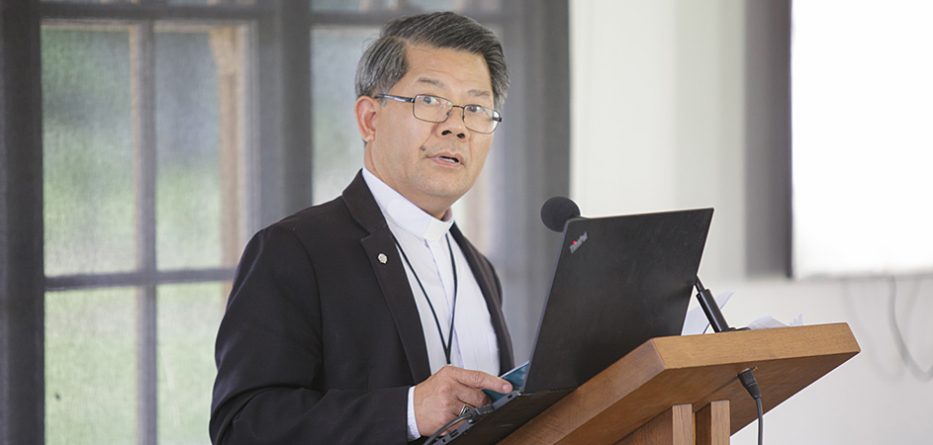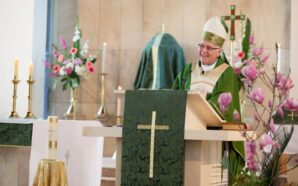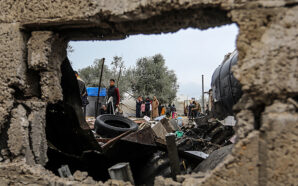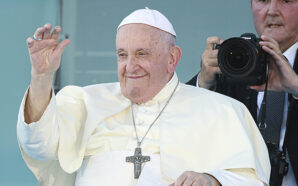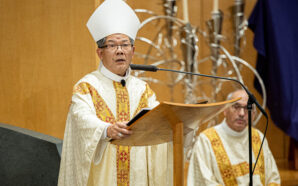Most Reverend Vincent Long Van Nguyen OFM Conv DD STL, Bishop of Parramatta
Virtual Address at the Catholic Education Diocese of Parramatta System Leadership Day 2021
“From Curiosity to Clarity to Challenge: Educating a new generation for the new future of shared destiny”
22 January 2021
Dear colleagues,
It is my privilege to join you at this virtual symposium. In spite of the inability to meet in person, we gather via technology to strengthen our sense of purpose, to give thanks to God for the grace of being able to contribute to the mission of the Church in Western Sydney, to make a difference to the students, parents, staff, teachers, and their respective learning communities.
It has been a particularly challenging year. We began 2020 with the fires that devoured millions of acres of bushland; then came the deluge that caused no less damage to homes and properties. Australia has lived up to its reputation as the land of extremes. None of these, however, had prepared us for the pandemic that followed. It has caused massive disruption to the way we work, engage and interact with others.
For many, the school is not just a centre of learning for students. It is a home and a place of stability, warmth and care. It is an indispensable part of a young person’s life, rain, hail or sunshine. You are to be commended for the way you led your school communities through a very unsettled time. Your generosity, creativity and care for all are the hallmarks of Christian leadership.
The coronavirus crisis reveals a world that is fractured. It tells us that the dominant mode of human conquest and dominion is no longer sustainable. The human-centred planet is out of sync with nature and heading to ruins. We may be on top of the food chain, but our survival depends on our partnership with every form of life. We need a radical new way of relating and living that brings harmony and sustainability to all of life.
We, humans, are part of the interconnected cosmic web of creation and we need to live a new paradigm of communion with all that is. The present crisis can be turned into new horizons of possibility, for us but also beyond us, to future generations and to the world that God loves.
Long ago, St Francis of Assisi advocated this paradigm. He intuitively understood the importance of living not as a self-centred individual but as part of the larger whole. He championed the art of living in deep harmony and communion. He called everything, even a worm, a brother or a sister. He pioneered the radical life of “sine proprio” (Latin for without appropriating), not necessarily without material things but without being possessive. We are easily frightened by dispossession because dispossession equals powerlessness. But this is what St Francis realised, material things can create an illusion of power that can vaporise by the snap of a virus.
Nature lives sine proprio because nature is sympoietic (sympoiesis is a process of collective organisation and production); it exists within layers of deep interconnectedness and flowing boundaries. Nature is not “red in tooth and claw”, not “big fish swallowing little fish”, but group gatherings, communal sharings and naturally occurring co-ops. The wolves in Yellowstone USA are as much dependent on the elks as the elks on the wolves in a delicate ecological balance that evolution has shaped over millennia.
The outdated Neo-Darwinian notion of survival of the fittest (grab what you can for yourself) undergirds our consumeristic, economic system of buying life at any cost. We will perish under these conditions unless we return to the roots of nature and rewire ourselves to be part of nature. For we belong to nature; nature does not belong to us. We have to rebuild our sense of personal, religious, social and political identity for a world of change and complexity, a world in evolution and techno-evolution. It is not only possible; it is the most exciting time in the history of our existence.
Pope Francis has given fresh interpretations to these insights of his namesake in his new book called Let Us Dream: The Path to a Better Future. I recommend it highly to you for your summer reading and reflection.
The COVID crisis, the Pope says, has exposed our vulnerability. It has revealed the fallacy of individualism as the organising principle of our Western society. It has given the lie to a “myth of self-sufficiency” that sanctions rampant inequalities and frays the ties that bind societies together. The virus has instead demonstrated our mutual dependency, interconnectedness as well as common vulnerability.
The selflessness of doctors, nurses, healthcare workers and others involved in maintaining our essential services is a powerful demonstration of those ties. They remind us that our lives are a gift and we grow by giving of ourselves: not preserving ourselves, but losing ourselves in service. What a sign of contradiction to the individualism and self-obsession and lack of solidarity that so dominate our wealthier societies!
Francis appeals for the strengthening of our ties with our Creator, with our fellow human beings and with all creation around us. This is the new organising principle needed to launch the planet towards a new future of shared destiny. Drawing inspiration from the biblical sources, Francis frames the pandemic in terms of its potential for positive change. Just as the great deluge was an opportunity for renewed humanity, the COVID crisis can therefore become our Noah moment. We can find our way to the Ark and to a new future as long as we recognise and foster the ties that bind us and all things together.
COVID has taught us “no one is saved alone”. That knowledge demands a new politics of inclusion and communion. It equips us to avoid both excessive individualism and the aggressive populism that thrives on identifying enemies at home and abroad. “Fraternity,” the Pope insists, “is the new frontier”, capable of knitting together the often competing demands of liberty and equality.
As we consider who and what we are in the mirror of the coronavirus pandemic, we can ask, ‘who are we and what do we hope for?’ How we live in a world of chaos and specifically as Catholic educators, how do we educate and equip young people for the challenges in the 21st Century. God is the name of life’s dynamic flow, oriented toward the moreness of life, the future. Where there is God, there is change and where there is change, there is future life. It is time to let go of the notion that we will return to “business as usual.” There is no “usual” and the rules of what is normative have been dispensed.
We are in a global breakthrough in evolution and if we want a different world, we must become a different people. We have a chance to rewire ourselves for a new existence, but we must begin to live in a new way. We must abandon the old framework of individualism, siloism and the default controllable, manageable and profitable systems that undergird the operations of our society. It is time to embrace our new reality. I believe that as educators, we have the opportunity to form a new generation that values the common good more than individual success. Just as the Pope calls for a new politics of inclusion in the light of the systemic inequalities in the world, we also need an education that forms young people into men and women of deep empathy, solidarity and communion as opposed to individualism and self-interest.
Dear colleagues,
We give thanks today for your vocation of leadership that engenders hope and promotes transformation. Though we have our weaknesses and limitations, the example and power of Jesus guide us in our endeavour to accompany others on the journey to wholeness.
We are custodians of the Good News. The Kingdom vision of Jesus guides us as we endeavour to be a community that serves as an antidote to the politics of fear, self-interest and the economy of exclusion in our society. We espouse a love that transcends borders and a social friendship that makes universal brotherhood possible. We are privileged to be partners with God’s plan for a shared destiny of hope, communion and life for all.
May we be strengthened to walk the journey of faith with one another and with those entrusted to our care. May we learn to become servants of the Kingdom, visible signs of hope and sacraments of God’s light to them in the COVID-world of chaos, change and evolution.
I conclude with the final stanza of Amanda Gorman’s The Hill We Climb that was powerfully delivered at the recent Presidential Inauguration Ceremony in Washington, D.C. to an America deeply divided and yet determined to forge a new future:
The new dawn blooms as we free it.
For there is always light,
if only we’re brave enough to see it.
If only we’re brave enough to be it.
Most Rev Vincent Long Van Nguyen OFM Conv
Bishop of Parramatta




